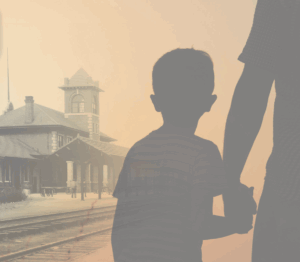
Horse whispers
CARY —
Their eyes meet — and for a second, they connect.
As Lorene Tanner runs her hand along the soft nose and silky cheek, she smiles.
She says she has a soft spot for her gentleman caller — speaking to him like they’re old friends.
She also says she remembers his last visit.
Truth is, she probably doesn’t.
And when Sid the miniature horse leaves her room, his time there will be just another experience she will lose until someone reminds her.
In the locked dementia unit at Woodland Terrace — a community reserved for seniors — memories are fleeting, but moments are precious.
And this is a moment.
•
Sandra Spooner says Sid is a ladies’ man.
He makes his way down the halls, stopping to visit with those congregating in the common areas and making personal visits to rooms.
He stands still and lets the patients stroke his face and mane — calm and steady and clearly enjoying the attention.
“He likes to be told he is handsome,” Sandra says.
One of the stops on today’s agenda is with Sandy Kirkland.
She is one of the regulars, one of the members of Sid’s entourage — residents who gather when they hear the horses are coming.
Mrs. Kirkland coos as she touches Sid’s face.
She pauses to acknowledge Sandra, but only for a moment.
“I love you, too,” she tells Sandra. “But I really love him.”
The reunion ends with a promise from Sandra that Sid will be back soon — even though it is likely that by day’s end, Mrs. Kirkland won’t remember.
The 14-year-old horse has been on many of these visits.
He knows how to stand, how to accept a kiss or a hug and how to connect.
And he will stay as long as the resident wants him, putting his chin on an armrest or the edge of a bed.
At 32 inches tall, he is the perfect height.
Sometimes, the stroking even puts him to sleep.
He and his brother, Teddy Bear, and his sister, Carmen, are regulars — unusual visitors who attract the attention of the staff and residents alike.
On this day, it is the two boys who are visiting. Carmen decided earlier that morning that she did not feel like making the trip, Sandra said.
Getting ready for the visits is a process.
Both Teddy and Sid had special baths.
Their manes were combed and their hooves shined.
They were equipped with special bags to avoid an accident, but Sandra says they are only a precaution, that the horses typically make their visits without any incidents.
“You can potty train a horse, just like a dog,” she says. “It is just that people usually spend more time with their dogs.”
A visit by a miniature horse is something to talk about.
But at places like Woodland Terrace, it requires evidence, Sandra said.
“We take pictures for them so they can show their families,” she explains.
After all, hearing that a horse visited that day sounds more like a story — a flash of fantasy from someone whose memories have been blurred or blacked out completely.
Unless, of course, you have that picture.
•
Decked out in natty top hats and bow ties, Teddy and Sid are not what most people expect to see in the hallways of an assisted living facility.
But their presence is part of Horse Hugs, the program Sandra started after she decided to bring miniature horses into her life.
“I wasn’t interested in horses myself,” she said. “But my daughter was obsessed.”
Her daughter spent hours and hours on the backs of jumpers — not the most comforting experience for her mother.
Sandra worked in big horse rescue for a while before discovering miniatures.
“I was petting one, and I was surprised at how relaxing it is,” she said.
And then, it hit her.
Perhaps, the smaller variety of horses was the right choice for her.
But she was not just looking for a pet.
“I wanted to have minis, but I decided that they had to have a job,” Sandra said.
And Horse Hugs was born.
•
Sandra’s horses — most are raised from babies, but some are rescues — go through training to fulfill their purpose: to bring joy to the lives of those who are facing challenges.
At first, that meant visits with children in hospital burn units.
But when a family member suffered a stroke and developed Parkinson’s, Sandra’s vision changed.
Her focus shifted to seniors.
It seemed, Sandra said, that they needed her and her little horses.
“A lot of them do not get visitors,” she said.
The arrival of the horses is an event, sometimes attracting attention from family members, who plan extra visits on Horse Hugs days.
“We schedule some places over and over again,” Sandra said.
And because the horses are small enough to put their heads in laps and accept a pat, they act as therapists — both emotionally and physically.
For some residents who spent their lives in rural areas, they spawn thoughts of days on the farm.
Others recall youths spent riding.
And while the memories they share might not be true reflections of a childhood long forgotten, in that moment — on that day — that time with Sid or Teddy creates a touchstone — a glimpse into the possibility of a memory.
“There is a lot of therapy, too,” Sandra said. “It really encourages the seniors to reach out and pet them.”
Not all residents react.
But Sandra is not deterred when she stops to see a patient who is unresponsive.
She knows better.
After reading a book on the journey of a patient suffering from dementia, Sandra decided that while she would bring her horses to everyone, she wanted to spend special time with those who seemed not to be even aware she is there.
“I talk to them. I rub their hands,” she said. “I look into their eyes. I know that just because they are not responding, doesn’t mean they aren’t hearing me. I know there is someone in there.”
•
Back at home, Sandra says her little horses are just like the big guys.
When they are off-duty, they romp in a pasture with their larger counterparts and the other animals on Sandra’s farm, which also include chickens and a donkey.
“They are horses,” she said. “They have to live like horses. They are herd animals. They need to be with other horses.”
But they are also individuals, Sandra says — capable of bad days, temper tantrums and the occasional refusal.
She shows them off proudly, telling each animal’s story over and over again.
She reminds those who see them that Teddy is new on the block and just learning the ropes.
“He is starting to get it,” she says.
Some of the horses have an instinctual drive to connect with the people they visit, while others simply enjoy the attention.
“One of my horses, Jesse, he just knew who needed him and what to do,” Sandra said.
Sid is compassionate, too, but he thrives on the attention. And he knows he is the senior member of the herd — and due the appropriate deference.
When Teddy is enjoying a visit at the end of the hallway, Sid decides it is time to join the party. He puts his head down and motors at a full miniature horse trot, pulling his guest conductor, new Horse Hugs volunteer Diane Forsythe, a retired veterinarian, down the hallway.
“He doesn’t want to miss out,” Diane says.
He is, after all, the veteran.
•
Sandra is proud of the difference her little horses make — both in her life and in the lives of the people they visit.
And she, too, benefits, from the time she spends with the seniors.
“It has taught me so much about empathy,” she said.
Sandra talks to the horses the same way the seniors do, with love.
She knows they are special.
“You are such a good boy,” she tells Sid. “A really good boy.”
•
Patricia Frew quickly rises from her bed when Teddy comes into view.
She wasn’t expecting a visitor, but could not resist the opportunity to welcome a horse into her room.
“Would you look at that,” she said. “Aren’t you something?”
Janet Harper, a staff member who works inside the dementia unit, smiles as the woman places both hands on Teddy and goes in for a kiss.
“These are the good days,” Janet said. “And here, you learn to appreciate the good days.”
So she watches as, with eyes closed, the woman places her forehead on Teddy’s — when she, in a whisper, tells her visitors that she has loved horses since she was a little girl.
Janet knows the patient’s recollection might be fantasy — and that, when she told Teddy and Diane she couldn’t wait to see them again as they exited, she might, when that day comes, have no memory of their first meeting.
But in that moment, it doesn’t matter.
“These visits just bring so much joy to the residents,” Janet said. “Even if they don’t remember it later today, it doesn’t mean it never happened. It’s important that they felt something — something real.”
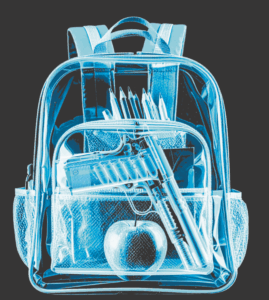
A loaded discussion
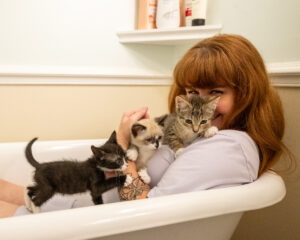
Fighting for their lives
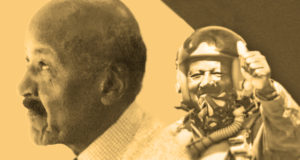
Goldsboro loses a giant
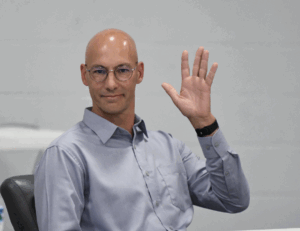
“I’m a flippin’ hurricane!”
Public Notices — Jan. 4, 2025
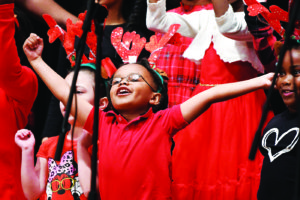
Belting it out
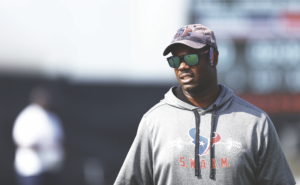
Legendary
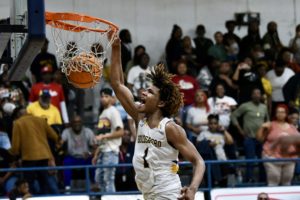
Final Four!


